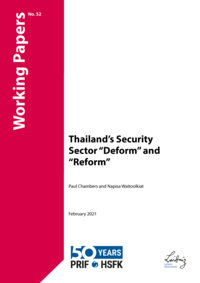Paul Chambers, Napisa Waitoolkiat
Thailand’s Security Sector “Deform” and “Reform”
Kurzbeschreibung
Despite a 2019 election, Thailand remains dominated by the military and monarchy. The state implemented security sector reforms at the national level and the Deep South regional level, before and after a 2014 military coup, which overthrew the country’s frail democracy. Thailand offers an impressive example of pitfalls and contradictory practices in security sector reform (SSR) because the country’s military junta supported globally transferred notions of SSR but applied them distinctively at different regional levels. Nationally, the military utilized universalist SSR notions to rationalize its prolongation and even expansion of autocracy. But regarding the Deep South insurgency, the junta applied a more progressive version of SSR, continuing negotiations with insurgents while reducing military abuses in the Deep South region. This study analyzes Thailand’s simultaneous “deform and reform” dynamics in the field of security sector governance. The authors examine why national SSR has been such a deform of more sincere SSR efforts in Thailand’s South.
Deutsche Zusammenfassung
Trotz der Wahl im Jahr 2019 wird Thailand weiterhin vom Militär und der Monarchie dominiert. Das PRIF Working Paper von Paul Cambers und Napisa Waitoolkiat "Thailand’s Security Sector “Deform” and “Reform”" diskutiert die Sicherheitssektorreform, die der Staat auf nationaler Ebene und auf regionaler Ebene im tiefen Süden durchführte, vor und nach dem Militärputsch 2014. Sie zeigen eindrucksvoll, welche Fallstricke und Widersprüche mit der Reform einhergehen.
Bibliographische Angaben
Chambers, Paul / Waitoolkiat, Napisa (2021): Thailand’s Security Sector “Deform” and “Reform”, PRIF Working Papers No. 52.

- Name
- PRIF_WP_52.pdf
- Erweiterung
- Größe
- 342,86 KB